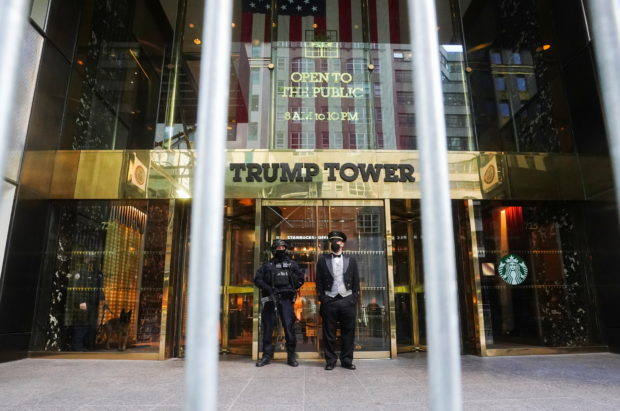
Trump tower is pictured amid the coronavirus disease (COVID-19) pandemic in the Manhattan borough of New York City, New York, U.S., January 20, 2021. REUTERS/Carlo Allegri
When lawyers asked Donald Trump more than a decade ago to identify who estimated values on some of his signature properties, he shrugged and pointed to his longtime accountant, Allen Weisselberg.
“I think ultimately probably Mr. Weisselberg,” he said, testifying in 2007 in a defamation lawsuit he brought against a journalist, a case that hinged on whether Trump had inflated the value of his business empire. “I never got too much involved, other than I would give my opinion.”
A judge dismissed that suit, but Trump’s comments illustrate the challenges now facing Weisselberg, 73, as he comes under scrutiny in Manhattan District Attorney Cy Vance’s investigation into whether the former U.S. president and his Trump Organization committed financial crimes.
Few people have been as deeply involved in Trump’s finances as Weisselberg, a trusted figure in Trump’s family business who began working for Trump’s father, Fred, in 1973 at the company’s Brooklyn office, paying bills and tracking the rental payments from apartment towers.
Legal experts and a source familiar with the criminal investigation say prosecutors’ apparent goal is to convince Weisselberg to cooperate with the probe into Trump’s dealings.
“They want him to turn,” said the person familiar with the investigation.
A spokesman for Vance declined to comment. Lawyers for Weisselberg and Trump did not respond to requests for comment.
The Manhattan district attorney said in an August filing that the office is investigating “possibly extensive and protracted criminal conduct” at the Trump Organization, though he has not fully disclosed the scope of the probe. In a September filing, he said “mountainous” misconduct allegations could justify a grand jury probe into possible tax fraud, insurance fraud, and falsifying business records.
Vance’s office and a separate civil probe by New York Attorney General Letitia James are both examining whether Trump misrepresented the value of his assets for tax benefits, among other potential violations.
Weisselberg’s unique position in the Trump Organization puts him among a small number of people who could provide prosecutors with crucial evidence of intent to commit fraud. Legal experts say Trump may try to put distance between himself and any controversial valuations of his properties and businesses by citing Weisselberg’s role as a financial gatekeeper, as he did in the 2007 defamation case.
“It may very well be that Weisselberg will be Trump’s defense in a criminal case,” said Michael Bachner, a defense attorney who once worked as a prosecutor with Vance in the Manhattan office.
If Trump argues that he merely relied on the advice of his accountants and lawyers, Weisselberg could be in the position of having to take the heat himself for any potentially fraudulent dealings, Bachner said – unless the accountant makes a deal with prosecutors and implicates Trump.
“If I’m Trump, I’ve got to be nervous about this,” he said.
The source familiar with the investigation said that, in addition to scrutinizing Weisselberg, prosecutors also asked questions about his sons, who also had connections with Trump: Jack Weisselberg, a director at Ladder Capital – a real estate investment firm that’s been a creditor for four Trump properties – and Barry Weisselberg, who managed skating rinks under Trump contracts with New York City.
Ladder Capital did not respond to requests for comment. Other Ladder executives, but not Jack Weisselberg, appear on loan documents involving Trump.
Jack and Barry Weisselberg did not respond to requests for comment.
Unique position of trust
On March 1, after the U.S. Supreme Court denied Trump’s last-ditch effort to keep his tax records private, Vance’s office obtained millions of pages of records on Trump’s taxes and finances. His office has also added a prosecutor experienced in organized crime and corruption, Mark Pomerantz, to the Trump investigation team, and interviewed staff at Ladder Capital.
As the Trump Organization’s chief financial officer and executive vice president, Weisselberg developed a unique position of trust with Trump, according to interviews with four former Trump Organization officials. The accountant handled Trump’s personal finances as well as the company’s most sensitive financial information, the officials said.
Barbara Res, Trump’s former construction manager, said Weisselberg was part of the Trump family’s inner circle, but he kept an unassuming profile. “He was the only one of the executives who would refer to Donald as Mr. Trump,” she said. “He was that kind of guy.”
Res said Trump trusted Weisselberg as a pair of eyes to make sure Trump’s other accountants and lawyers were doing their jobs. “Allen wouldn’t go outside the company,” she said. “Allen wouldn’t talk; Allen could be trusted to keep things quiet.”
When Trump’s former lawyer and fixer, Michael Cohen, arranged for a hush-money payment to porn actress Stormy Daniels, Weisselberg was involved in cutting the checks, Cohen testified in a February 2019 hearing held by a committee of the U.S. House of Representatives. Weisselberg obtained limited immunity from federal prosecutors to provide information in the investigation that targeted Cohen; he was not charged with wrongdoing. Cohen pleaded guilty to tax evasion and campaign finance violations.
Vance could seek a court order granting him access to Weisselberg’s testimony in the federal case against Cohen, legal experts said.
During the 2019 committee hearing, Cohen identified Weisselberg as one of the Trump executives who knew that Trump inflated assets in statements to insurance companies for the purpose of reducing premiums. In response to questions from Democratic Representative Alexandria Ocasio-Cortez, Cohen said he could not confirm a New York Times report on whether Trump under-reported values on inherited real estate to reduce his taxes.
“Who would know the answers to those questions?” she asked.
“Allen Weisselberg,” Cohen said.